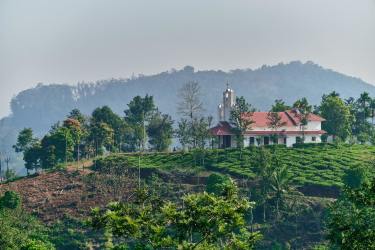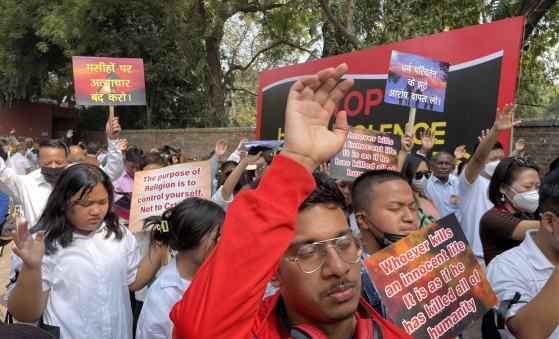
The Kerala High Court has upheld an individual’s fundamental right to change their religion and have this reflected in educational records, delivering a landmark judgment that reinforces constitutional protections for religious freedom.
Justice D.K. Singh ruled in favour of Sudhin Krishna C.S., a 32-year-old man who sought to change his name and religion in his Secondary School Leaving Certificate (SSLC) records after converting from Islam to Hinduism.
The petitioner, originally named Mohammed Riyazudeen C.S., was born to parents of different faiths—a Muslim father and a Hindu mother. Though born in Palani, Tamil Nadu, he was raised by his mother in Kerala’s Palakkad district, following Hindu customs and traditions.
“After he attained majority, the petitioner found that he does not believe in Islam and he practises the Hindu religion, inasmuch as he was brought up by his mother according to the tenets of the Hindu religion,” the court noted in its judgment delivered on 26 May 2025.
The petitioner completed his secondary education at Grace Higher Secondary School, Kodunthirapully, which is no longer in existence. When his name was entered as Mohammed Riyazudeen C.S. during school admission, he was a minor, and it was his father who recorded the particulars, including his name and religion as “Islam, Mappila”, in the school records.
The man officially converted to Hinduism through Arya Samaj in November 2021 and obtained a gazette notification in June 2022 to reflect his new name and religion. He is also married to a Hindu woman, according to court records.
However, when he approached the District Educational Officer on 6 June 2024 seeking changes to his SSLC records, authorities rejected his request. The petitioner received a communication dated 19 August 2024 stating that “there exists no provision in KER 1959, to effect the changes in the religion in the School Leaving Certificate.”
The rejection prompted a legal challenge, with the petitioner arguing that Rule 3(1) of the Kerala Education Rules, 1959, does permit such changes.
Government representatives contended that no authority had been officially appointed to change religion or caste in school records, with only the Commissioner of Examinations authorised to correct dates of birth under a government order dated 30 June 2022.
Justice Singh firmly rejected this argument, stating: “There can’t be multiple authorities for effecting the changes in date of birth, caste and religion.”
The court examined Rule 3(1), Chapter VI of the KER, which reads: “The name of a pupil, his religion and his date of birth once entered in the Admission Register shall not be altered except with the sanction of the authority specified by Government in this behalf by notification in the Gazette.”
“The heading of the Rule is ‘Alteration of Date of Birth etc.’ It is not only for the date of birth. The other changes may also be effected by the competent authority, which would include religion and caste besides the date of birth,” Justice Singh observed.
The court ruled that the same authority empowered to change dates of birth could also modify name, caste, and religion in school records.
Citing Article 25 of the Indian Constitution, which guarantees freedom of conscience and the right to freely profess, practise, and propagate religion, Justice Singh emphasised the constitutional protection for genuine religious conversion.
“If a person has changed his religion without any coercion, fraud, undue influence etc., such an act would be protected under the Constitution of India under the preamble as well as Article 25,” the judgment stated.
The court elaborated on constitutional protections, stating: “The Constitution of India gives freedom to the citizens of India of their conscience, faith and religion. The preamble of the Constitution of India aspires to secure all citizens inter alia liberty of thought, expression, belief, faith and worship.”
The judgment emphasised that Article 25 “guarantees freedom of conscience and free profession, practice and propagation of religion, subject to public order, morality and health etc.”
The court observed that under the constitutional scheme, every person has a fundamental right not merely to entertain religious beliefs of their choice but also to exhibit these beliefs in a manner that does not infringe upon others’ religious rights and personal freedom.
“Therefore, when it is not the case of the respondents that the person has changed his religion because of fraud, undue influence or coercion, then the citizen must be allowed to practise the faith and religion of his choice,” the court stated.
Justice Singh referenced several Supreme Court precedents, including the Sarla Mudgal case, Lily Thomas judgment, the Sabarimala Temple case, and Dr. M. Ismail Faruqui case, all of which reinforce individual religious freedom while ensuring such freedom does not encroach upon others’ similar rights.
The court quoted extensively from the Lily Thomas case, noting that “freedom guaranteed under Article 25 of the Constitution is such freedom, which does not encroach upon a similar freedom of other persons. Under the constitutional scheme, every person has a fundamental right not merely to entertain the religious belief of his choice but also to exhibit this belief and ideas in manner which does not infringe the religious right and personal freedom of others.”
The court directed the Commissioner of Examinations to effect the requested changes to the petitioner’s name and religion in his SSLC records, clarifying that the authority empowered to change dates of birth has equal power to alter caste and religion entries for students.
The case was represented by advocates Santheep Ankarath and P. Anirudhan for the petitioner, while Government Pleader Parvathy Kottol appeared for the state.
This ruling has broader implications for religious freedom in India, particularly strengthening administrative protections for religious minorities and converts. The judgment could be particularly significant for Christian communities, who often face bureaucratic obstacles when updating official documents following conversion. It establishes a clear precedent that voluntary religious conversion must be administratively recognised by government institutions, addressing a key practical barrier that has historically affected religious minorities seeking access to education, employment, and other opportunities.
However, a Christian leader, who requested anonymity citing security concerns, cautioned that the judgment’s practical impact could remain geographically limited, as it is legally binding only within Kerala. “Christians in states with stringent anti-conversion laws, including Uttar Pradesh, Madhya Pradesh, and Chhattisgarh, may continue to face significant legal and social barriers,” the leader said. “In these jurisdictions, anti-conversion legislation often presumes coercion in conversions to Christianity, requires bureaucratic scrutiny, and has led to arrests of pastors and converts. Administrative authorities in such states may still deny record changes or initiate investigations despite the Kerala precedent.”
The leader noted that the ruling’s significance lies in its potential as persuasive precedent for future legal challenges. “By explicitly affirming Article 25 protections and citing multiple Supreme Court precedents, the judgment strengthens the constitutional foundation for challenging anti-conversion laws at the national level,” the leader observed. “If the Supreme Court takes up similar cases, it may draw upon such High Court rulings when interpreting religious freedom protections.”




